Bad information drives out good or how much can we trust Wikipedia?

This post is written on behalf of the LabPlot team. It’s different compared to what we usually publish on our homepage but we feel we need to share this story with our community.
Introduction
You might already know this, but finalizing a release for a project with the complexity and scope like that of LabPlot can be hard and exhausting. After our latest recent 2.11 release, we decided to take a short break and distance ourselves from coding and take care of other non-coding related tasks, like discussions around the NLnet grant for LabPlot, our ongoing GSoC projects, the roadmap for the next release, improving our documentation, the gallery on the homepage and the article about LabPlot on Wikipedia. Don’t worry, we’re already back to coding and working on new features for the next release 🙂
The article about LabPlot on Wikipedia (we are talking about the ‘EN’ version here, but the situation is similar for other languages) was completely outdated and still containing the information about LabPlot1 from Qt3/KDE3 times. The article became largely wrong with the introduction of LabPlot2 and with further developments in recent years. Among other things, the feature set described on Wikipedia was very far from being correct and complete in comparison to the description for other applications of its type.
The current situation was clear for us and it was also evident what needed to be done. Let’s go ahead and improve the article, we thought. Hey! Being able to contribute and to share your knowledge with everybody is the advantage of Wikipedia, right? Easier said than done…
Key Takeaways
But before we begin:
- Wikipedia itself points out that the purpose of Wikipedia is to benefit readers by acting as a comprehensive compendium that contains information on all branches of knowledge. For this purpose, as it is clearly stated on Wikipedia, “Wikipedia has many policies or what many consider “rules”. Instead of following every rule, it is acceptable to use common sense as you go about editing. Being too wrapped up in rules can cause a loss of perspective, so there are times when it is better to ignore a rule. Even if a contribution “violates” the precise wording of a rule, it might still be a good contribution.” Link: Use common sense.
- According to Wikipedia there is no need to read any policy or guideline pages to start editing. The five pillars of Wikipedia are a popular summary of the most important principles. And the three of the pillars are formulated as follows: 1. Wikipedia is free content that anyone can use, edit, and distribute. 2. Wikipedia’s editors should treat each other with respect and civility. 3. Wikipedia has no firm rules. And If a rule prevents you from improving or maintaining Wikipedia, ignore it.
- In this Wikipedia’s article on https://en.wikipedia.org/wiki/Wikipedia:Dispute_resolution it is stated that once sustained discussion begins, productively participating in it is a priority. Editors should focus on article content during discussions; comment on content, not the contributor. And when an editor finds a passage in an article that is biased, inaccurate, or unsourced the best practice is to improve it rather than deleting salvageable text.
- I fully acknowledge these common-sense principles. I accept the fact that some phrases of the original version of the new content added by Dariusz, another core member of the LabPlot team, might have possibly infringed a less general rule on Wikipedia, and that’s why he asked for a constructive assistance, to no effect.
- I can also accept the reality and the existence of different users with the various amount of expertise, goodwill and power. The worst case are people contributing in a subversive manner over long time to such an open project to achieve more power and authority and completely different and evil goals later, and this can also be related to users with granted power. See the recent XZ Utils backdoor. I also accept the fact that the amount of work behind the scenes on Wikipedia requires the usage of automated mechanisms and bots (“Meet the ‘bots’ that edit Wikipedia”).
- However, I cannot accept the fact that the quality of knowledge on Wikipedia can be seriously undermined by power users heavily using algorithms and blindly enforcing some subjectively selected, narrow rules against the general principles outlined above, and at the same time not being open to any constructive discussion. The fact that complete content and comments are censored and removed by users with granted power or by their (semi-)automated tools, which deceives the reader and distorts the history of the discussion, is definitely not acceptable. And this is apparently not an exception, see the links here, here and here and many other similar discussions on the internet.
Keep the above in mind while you read what happened.
The incident I want to share with you is certainly not about LabPlot and its team. It’s about the negative impact of blindly invoking algorithms or quoting a single rule by Wikipedia’s users with granted power on the overall quality of the information stored on Wikipedia. As Dariusz noticed, in economics there is the observation that “bad money” drives out the “good money” from the market (Gresham’s Law “bad money drives out good”). We wonder whether the actions of the entities like MrOllie, some of which are described in the next parts of the article, are enough to justify the introduction of a new law for Wikipedia “bad information drives out good”?
Chain of events
In order to make the content correct and to provide an up-to-date description of the project, similar to the articles for other projects mentioned e.g. on https://en.wikipedia.org/wiki/List_of_information_graphics_software, Dariusz did multiple edits of the article over the course of two days using his Wikipedia account ‘Dlaska’. Very soon after that, the entity MrOllie became aware of his changes and reverted them completely with the suggestion that it was a promotional rewrite. Then, a “user talk” with Dariusz was initiated by MrOllie:
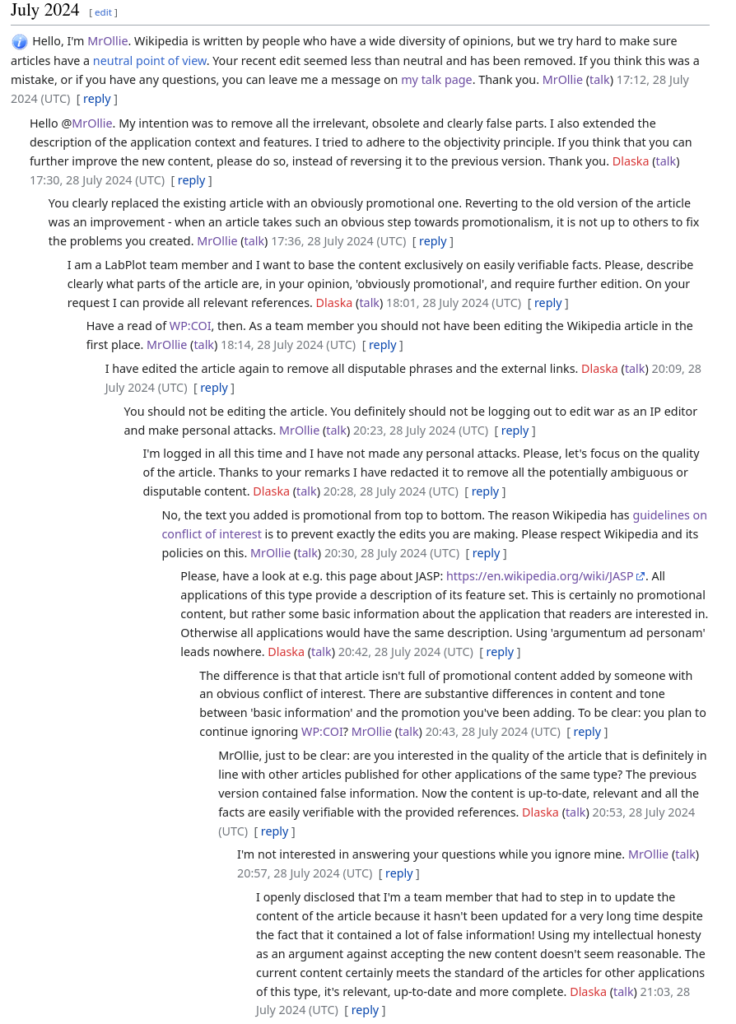
We are all volunteers, having no benefit other than satisfaction from developing LabPlot. But sticking to the principle of intellectual honesty, Dariusz himself fully disclosed to MrOllie that he is a LabPlot team member that felt obliged to step in to correct misleading information in the article and to make the content more complete and up-to-date, because no one has done it for a long time. Unable to get any suggestions from MrOllie despite Dariusz’ requests, Dariusz removed any phrases that could even potentially have promotional qualities (e.g. rename “strongly support” to “support”). Unfortunately, even this had no effect on the actions of MrOllie, resulting in the revert of the new content.
In parallel, I joined these activities and reverted the revert done by MrOllie and provided some explanations for this step. Another “user talk” with me (I don’t have any account, you see my IP address here) was initiated by MrOllie:
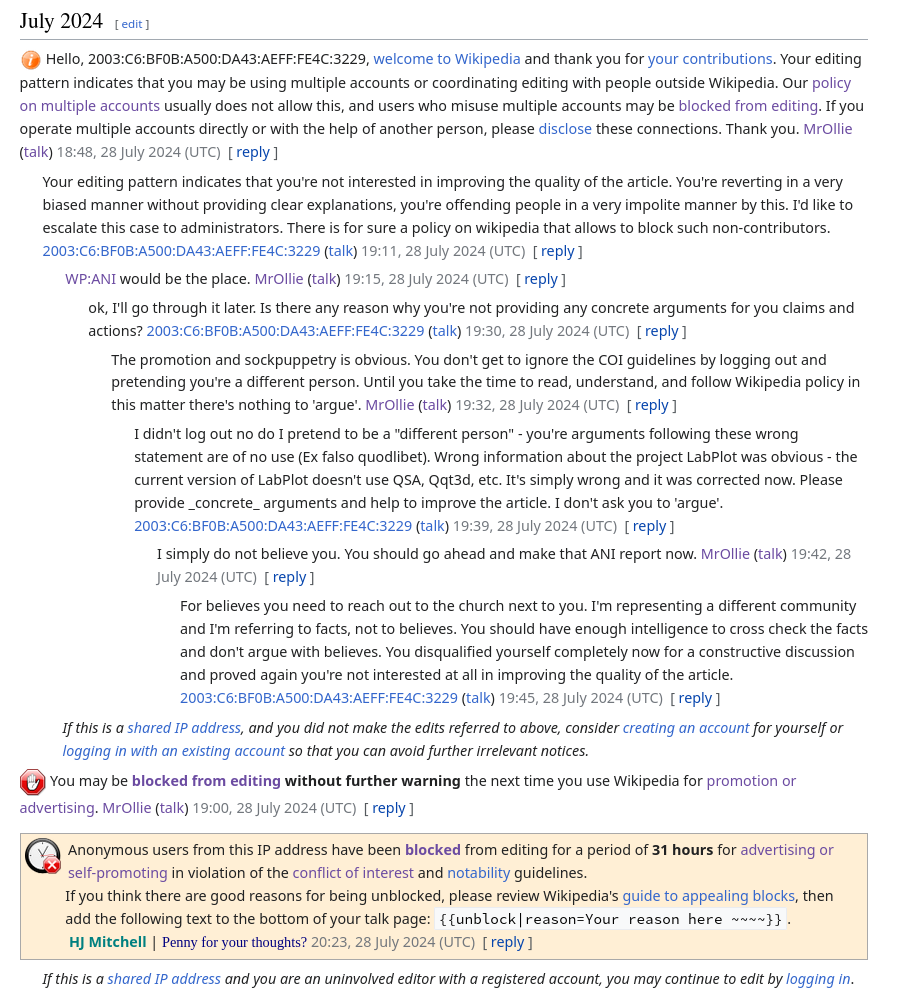
After multiple back-and-forth reverts, my IP was blocked and a “Conflict of Interest on the Noticeboard” was raised by MrOllie where he quickly got the support from his peers on Wikipedia. Dariusz’ comment didn’t change anything in the overall situation:

In parallel, more seasoned Wikipedia users jumped on the bandwagon and started ‘editing’ the article by first blindly reverting the article to the version containing potentially promotional content and then removing even more and more content and references with arguments that, in our perception, didn’t make sense arguing with anymore. Any discussion seemed completely ineffective. After most of the content had been removed from the article, to the point that the new version was more deprived of content than the old version, the user Smartse added a notability tag which was later turned into a notification box to the article stating this article “may not meet Wikipedia’s general notability guideline.”. Notability is a test used by editors to decide whether a given topic warrants its own article. So in our perception this could be interpreted as a threat of removing the article completely. The size and severity of the problem we were confronted with was already obvious at this point.
After my IP was unblocked (or maybe because I just got a new IP from my ISP), I was able to reply on this noticeboard. Since I was already foreseeing it’s going to be deleted, I took a screenshot (this is also the reason why I did screenshots for all other events):
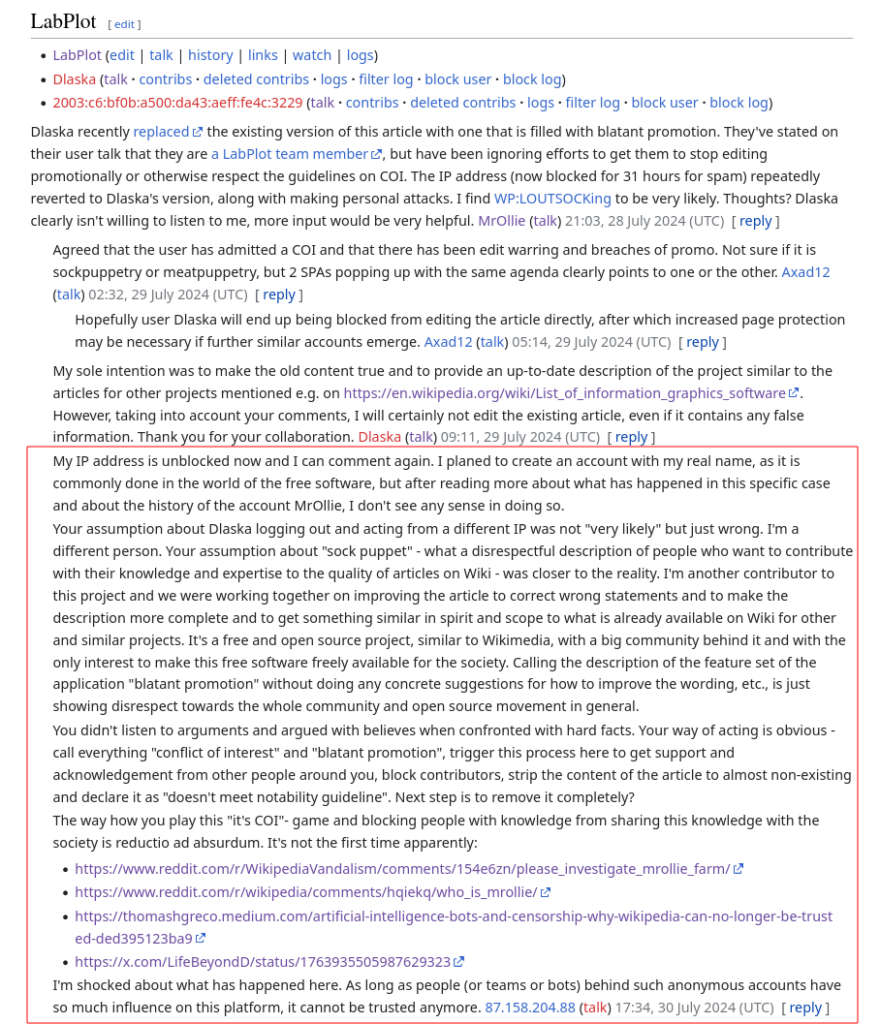
Practically immediately my reply, red-highlighted above, was deleted without any comment or note and this is how this thread looks like afterwards:
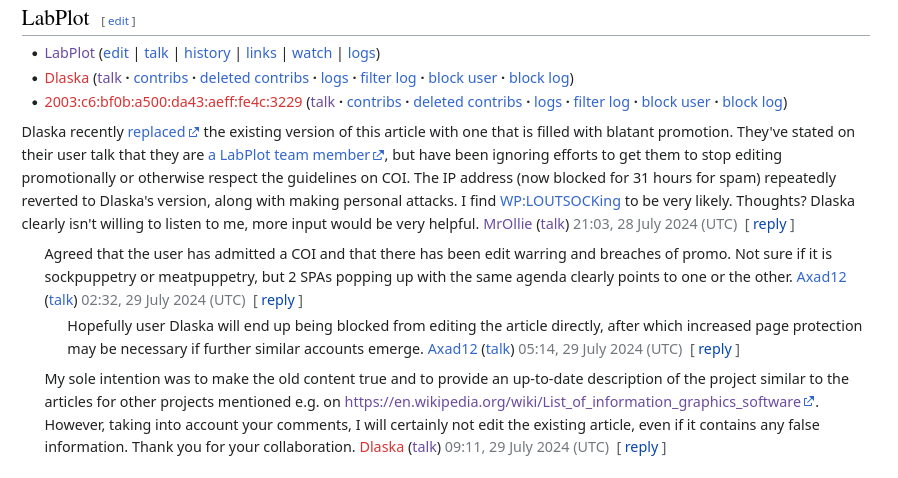
Fortunately, Dariusz, who has an account in Wikipedia, got the notification about my added reply via email:
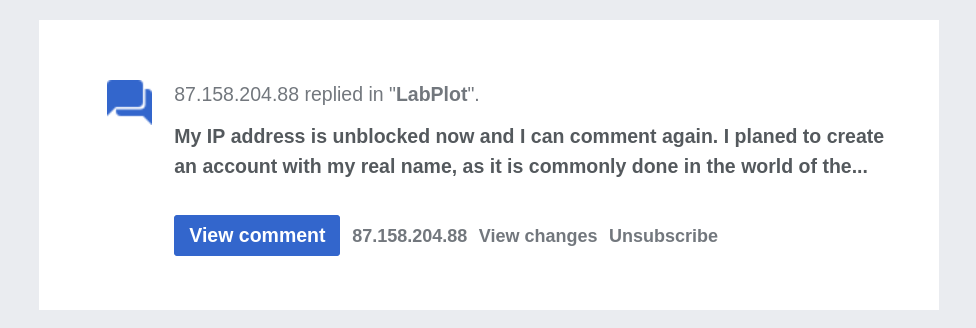
and after clicking within seconds on the link in the email he was informed that the comment might have been deleted, and it sure was, right after it had been added.
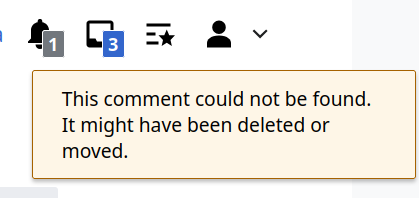
Immediately after this, another notification box with “A major contributor to this article appears to have a close connection with its subject.” was added to the article:

and my new IP was blocked for “abusing multiple accounts” and using them for “illegitimate reasons”:

After all these deletions, see the full history of changes
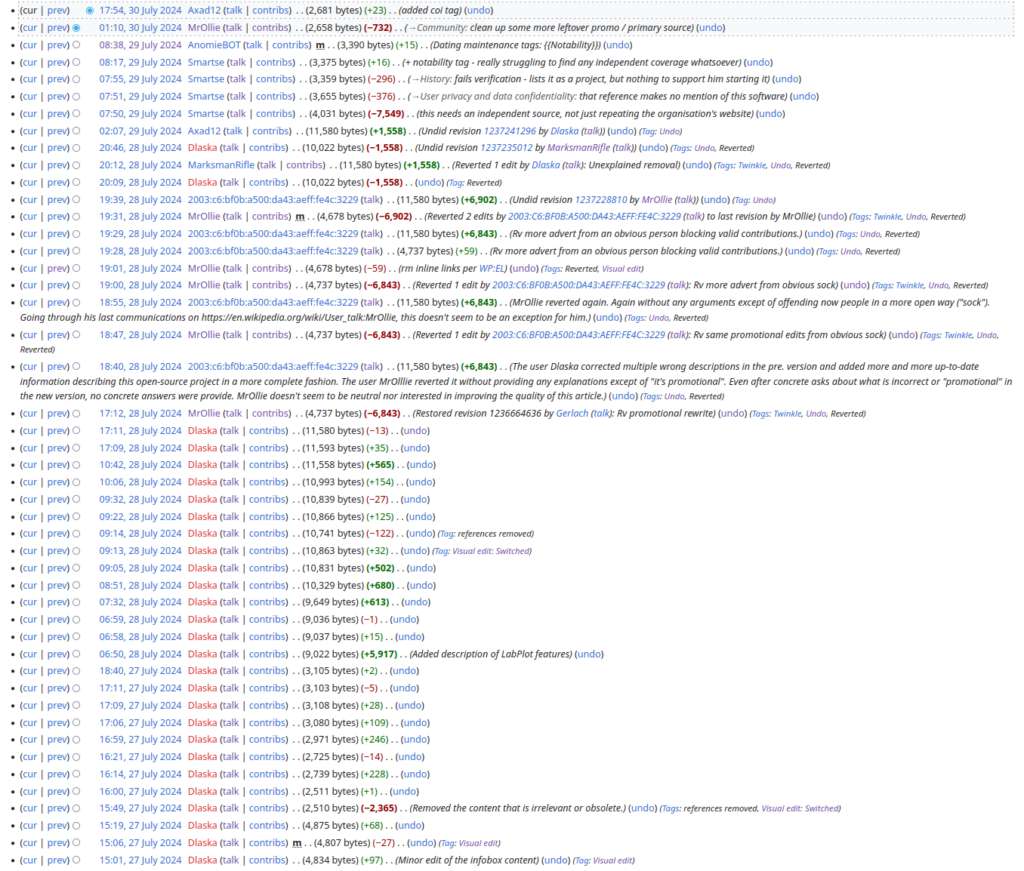
This is how the article looks like in its “final version”:
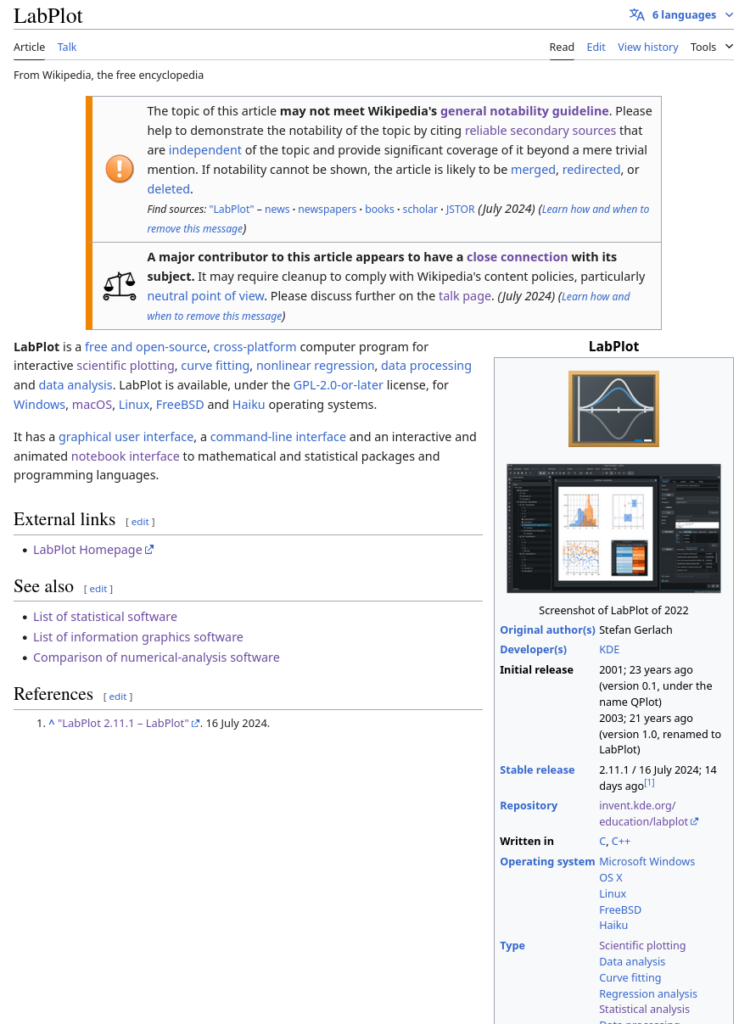
In retrospect
What seems to have happened here looks like a well coordinated or even (semi-) automated chain of events with a pre-defined replies, arguments and actions. MrOllie stands out for the incredible diligence and regularity of his activity. The chart below shows the number of edits he has made by day of the week and hour (in local time), from 2008 to the present (source of the chart: https://xtools.wmcloud.org):
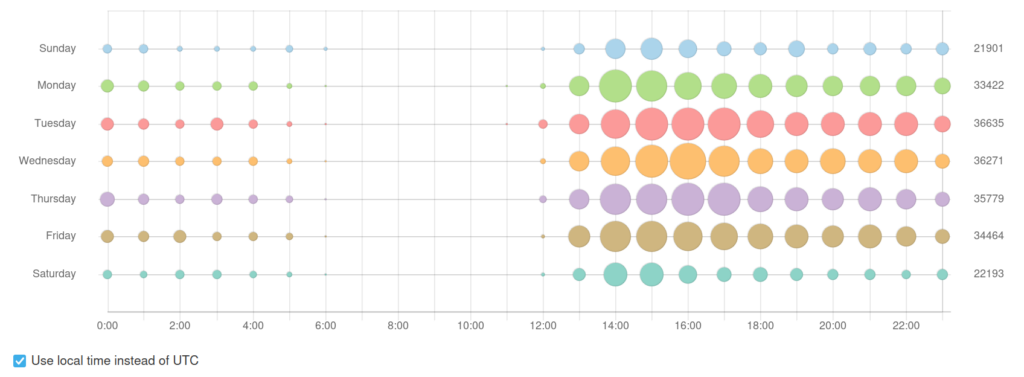
Also, over 75% of MrOllie’s edits are done in a semi-automated way with the help of tools on Wikipedia like Twinkle. So, this account functions like a programmed algorithm or somebody who is heavily relying on them.
Seeing no reasonable chance of correcting this situation in the context of being deprived of the right to effectively discuss the matters with entities like MrOllie, we gave up on our initial idea to improve the article.
What’s next?
After reading more on this subject we realized that this problem is not new, but apparently it is not common knowledge either. Completely independent of who or what censored us – AI bots (is AI already winning over us?), good or bad editors etc. – trusting Wikipedia now is much harder than before. Still, the question remains about what to do next.
We can completely give up the idea of contributing to this platform and rather focus on other channels like our homepage and other online resources in the KDE and free world (Mastodon, etc) and provide more and more useful information.
Alternatively, we can ask for support from other people with more experience in editing and maybe even with more authority on Wikipedia to help us to get a reasonable description of the project on Wikipedia to the benefit of Wikipedia’s readers and LabPlot’s users.
Thoughts?
Links
For the sake of completeness and of easier usage, here are the links mentioned in my reply that were deleted:
- https://www.reddit.com/r/WikipediaVandalism/comments/154e6zn/please_investigate_mrollie_farm/
- https://www.reddit.com/r/wikipedia/comments/hqiekq/who_is_mrollie/
- https://thomashgreco.medium.com/artificial-intelligence-bots-and-censorship-why-wikipedia-can-no-longer-be-trusted-ded395123ba9
- https://x.com/LifeBeyondD/status/1763935505987629323
Note, for the first two links above, the original posts in the Wikipedia related channels on Reddit about the same MrOllie account on Wikipedia were deleted, shame on those who think evil of this. The comments are still available, though, and the reader can get at least an idea about the original content of those posts.
Edit
We added a short post about the article to r/wikipedia on Reddit, but it was removed by the moderators just 2 hours later, without any comment.
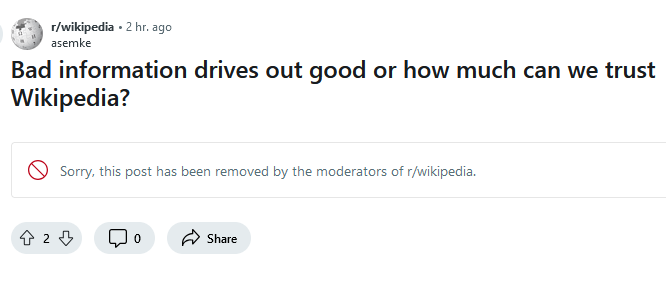
If, after reading this article, you think MrOllie and his counterparts are capable of correcting their own actions, take a look at the exchange below. It’s also an indication of what the future may hold for the LabPlot article on Wikipedia… Source: https://en.wikipedia.org/w/index.php?title=User_talk:MrOllie&oldid=1240636433

Update (20.08.2024)
We’ve been informed that a Wikipedia’s editor (Smartse) has today nominated the article about LabPlot for deletion, so before making any hasty, not to say retaliative, decisions, we encourage Wikipedia editors to reach a sensible “consensus” in the context of information published on these websites:
- https://labplot.kde.org/references
- https://en.wikipedia.org/wiki/List_of_statistical_software
- https://en.wikipedia.org/wiki/List_of_information_graphics_software
- https://en.wikipedia.org/wiki/Comparison_of_numerical-analysis_software
The last three links refer to Wikipedia’s articles about other applications similar to LabPlot. As far as we know, none of them have been nominated for deletion. In the meantime the article has been given a “protected” status.
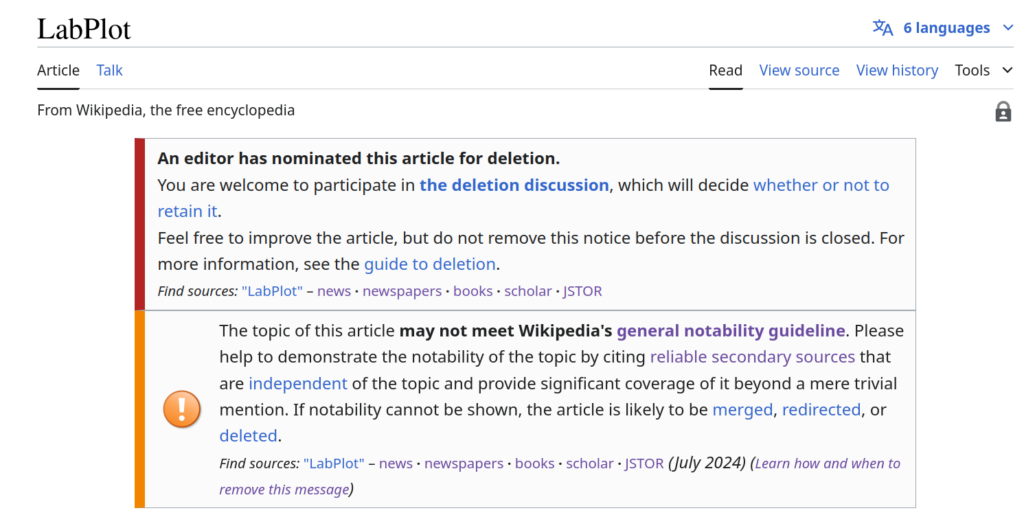
Update (21.08.2024)
So far we have provided a list of nearly 50 research papers from various scientific fields that show that LabPlot has been used for research and teaching purposes. It would be unreasonable to expect researchers dealing with domain problems to devote a significant part of their research papers to describing LabPlot. In contrast, the following article is devoted entirely to LabPlot. The professors Williams Morales González and Jesús Eleuterio Hernández-Ruíz described the program’s functionality and usage in detail [1]. This fits into the Wikipedia’s General notability guideline:
- “A topic is presumed to be suitable for a stand-alone article or list when it has received significant coverage in reliable sources that are independent of the subject.”
- “Sources do not have to be written in English” and “there is no fixed number of sources required.”
- “Notability is based on the existence of suitable sources, not on the state of sourcing in an article.”
Below is a (semi-)automatic translation of the authors’ conclusions:
The experiences of the professors of the Experimental Physics group of the UCLV Physics program in the use of LabPlot as a tool for the analytical and graphical processing of experimental data were presented.
LabPlot is a free, open source, multiplatform software with KDE desktop design and similar characteristics to Origin. It is intended for interactive analysis of experimental data and includes a wide variety of operations for analytical and graphical data processing, including linear and nonlinear fitting and data extraction from external plots, without the need for licensed software.
LabPlot can be used as a tool for experimental data processing, not only in Experimental Physics, but also in the scientific work developed by students from the second year of the course and culminating with the diploma work.
Does this information have any real relevance to Wikipedia editors? Time will tell.
[1] Williams Morales González. Jesús Eleuterio Hernández-Ruíz. 2022. Experiencias en el uso del software LabPlot en el procesamiento analítico y gráfico de datos experimentales. Conference: VII Taller de Enseñanza de la Física At: Universidad de Oriente, Santiago de Cuba. https://www.researchgate.net/publication/361586279_Experiencias_en_el_uso_del_software_LabPlot_en_el_procesamiento_analitico_y_grafico_de_datos_experimentales.
I want to thank you Dariusz for his contributions to this article.
As far as i can guess, MrOllie is a user running a bot, who manually answers when it triggers discussions.
He will do what is the lowest effort for him. He can not manually fix articles, because of the sheer amount the bot triggers on.
So he lets the bot revert. When he spotted the COI (which is not usually a ground for a complete revert) he latched on it. Arguing according to a boilerplate with you, is less effort than manually fixing.
He will also be very reluctant to admit mistakes of the bot, because then he would have to manually check all past bot-made edits for similar issues.
Wikipedia has many guidelines in place that allow quickly shutting down users. And most of them are not by evil intention, but by wanting to “resolve” a high quantity of issues very fast.
If you have a discussion with a power user, you can get blocked with the reason that you argued. If you revert a revert of a power user or mod (even when a clear reason is stated), the article can be locked and you blocked because you did an edit war.
Whatever action would be best for the articles, is not up to debate. The established user wins on his status.
btw. paid editing is allowed on wikipedia. There are also wikipedia moderators with sock puppets, political organizations employ wiki mods, etc. – many things going wrong, many blog posts about (including from Larry Sanger, a founder) it all over the internet, yet nothing ever changes.
In my opinion, the best action would be to wait. Let a few weeks pass and then some IP that isn’t tarnished can edit (i can do that when it’s time).
If you want to play by the wikipedia rules (which the moderation itself doesn’t play by), you can use this template to request an edit under COI: https://en.wikipedia.org/wiki/Template:Edit_COI
But i would not recommend that, the edit request could simply be ignored and rot for months on the Talk page and a regular user can not help you edit if: “There is already a request :^), wait for that to be approved”.
As you might have guessed… i already had a similar experiences years ago.
Thank you for your valuable input and for sharing your experiences. Apparently we were too naive to foresee such a chain of events. Hopefully, others can also learn from our mistakes.
First, when First, when somebody tries to comment, the text intry is white (both Firefox and Vivaldi).
Second, as a dislaimer, I edited wikipedia maybe 7 times in my life. I read it frequently as anyone. This is the version of the article that was the result of all dlaska changes: https://en.wikipedia.org/w/index.php?title=LabPlot&oldid=1237204546 . With all due respect, it does feel like a promotional text and the revert was correct as per policy and common sense. The reason that people should not write about themselves is straighforward and falls under common sense. It is extremely hard to prevent bias. That Wikipedia reverted this speaks to its strength, however I understand it might be frustrating for you. The only mistake they made was thinking you were one person – but they seem to corrected that mistake.
some example of promotional content:
Balancing analytical power with user-friendliness, this versatile tool is suitable for both casual users and professionals in scientific and technical fields.
Sophisticated signal processing functions
t supports multiple notebooks and languages simultaneously, enhancing productivity
extensive editing capabilities, robust plotting,
for easy sharing and presentation.
These features significantly streamline the data processing workflow, saving time and effort for users.
etc.
No wonder nobody wanted to correct that, it would need to be rewritten completely (plus I think it is too long and frankly it is horrible to read, like any promotional content). I do not assume any bad intention on your part, it is very understandable you cannot write about your own software neutrally.
@Tomas
In this edit, Dlaska removes the promotional sounding sentences:
https://en.wikipedia.org/w/index.php?title=LabPlot&diff=prev&oldid=1237241296
The edit then got reverted with no reason stated and the promotions put back (?!).
And in the next they remove the whole feature section, saying that it needs more sources than the project website:
https://en.wikipedia.org/w/index.php?title=LabPlot&diff=prev&oldid=1237336495
This doesn’t usually happen in articles about software. The norm is that a feature list either doesn’t have a reference or it references the project.
This is where the “assume good faith” ends for me. They simply got on bad terms. Doesn’t matter what they would have done at this point, it wouldn’t have been accepted.
I would wait some time and then put the feature list back in, slowly and part by part. So if a specific section raises an issue, it can stand on its own.
Am I th e[Am I the only one, who, when trying to comment, writes in white font so nothing is visible? Kate comes to the rescue!]
I am not saying everything that happened was ideal. However, I think that “not editing wikipedia to promote something you are involved in” falls under the common sense. So I think you do not accept enough of the blame in the key takeways.
Look at it from other side: you are an exception coming from a non-profit commercial volunteer driven project (but still in competition with other similar project). Most editing by people about something they are involved in is not done from such a noble motivation. So you fall under the bus of fighting much bigger clearly illegitimate spam.
I have been on a receiving end of people who do something online many times (be it open source maintainers or openstreetmap editors etc.). They are mostly overwhelmed. I do wish they were nicer to me at times (I think it would be instrumental to their goals, even), but I know it takes time and I do not blame them too much. Sometimes they are quite right that I am comppletely beside the point or I screwed up. Your post feels too confontational for me to intuitively back you.
The further away from a topic you are, the less you know about it and the more entitled you are to edit Wikipedia’s articles in this area? Does that sound reasonable? It should be rather the opposite, unless an expert is proved guilty of twisting facts or fabrication of evidence. Larry Sanger, a co-founder of Wikipedia, argued that “Wikipedia lacks credibility and accuracy due to a lack of respect for expertise and authority”. This seems about right. [1]
[1] https://en.wikipedia.org/wiki/Larry_Sanger
Maybe, but that is a separate things. I think experts should be welcome – but experts would usually be able to provide sources for their edits. It is another concept from a bacis premise “do not write about something you are involved in (as an author) because you will not be neutral”. That is a good principle.
Clearly, you are too deep into wanting to put too much into Wikipedia. Dolphin and Konsole articles contains few at best few sections and some screenshots. LabPlot may not need much more.
I know, LabPlot is mostly used by students and scientists for which Wikipedia is a daily tool, but this actual website speaks enough for itself so Wikipedia could never have some much information/screenshots.
At best, you could expect that people type LabPlot in search engine and from another Wikipedia page, then once of the LabPlot Wikipedia page, spend few seconds reading the article, then click to go to this actual website. They won’t enjoying reading ten sections about the software.
That saying, I feel pretty bad about all the time you spent on writing a full Wikipedia article, and even if I’m not a regular Wikipedia contributor neither a LabPlot power-user, I could try to sort it out some information from older revisions (like 1237290721) to add to current article (like removing “User privacy and data confidentiality” and “Documentation” sections that I don’t find to fit into a Wikipedia article).
It may not be accepted (or be detected as spam/unwanted edit) but I really like LabPlot and I share the same feeling that the Wikipedia article should be more complete as other KDE softwares.
Thank you for your comment and the nice words about LabPlot! We appreciate your understanding. Under the “key takeaways” section in the article we admit that we’ve made some errors as a novice editor. And we honestly tried to improve through a constructive discussion, but as you’ve probably already noticed, that was not really possible, and that’s what the story is mainly about.
Wikipedia needs secondary (and reliable) sources, and your version only contained links to this website or KDE. The article was already flagged as not providing any secondary source back in 2009 (as shown in Talk page), so I guess admins will remove any adding as long as some sources haven’t been added.
I’ve edited the Wikipedia article (I don’t know if it will last) to add the NLnet funding reference, which is the only reliable link I could find linked to LabPlot. If you’ve got any more information on it (progression, commits, etc.), it could be a nice addition to Wikipedia.
Because I wasn’t able to find any review of LabPlot or any reference to some university or public project openly using LabPlot, at least not in English. I don’t even know if any (major) Linux distro is offering LabPlot installed by default.
For the links on social networks, they could be added to https://alternativeto.net/software/labplot/about/
The more people knows about LabPlot, the more it will be covered on internet, the more content could be added to Wikipedia (since it only works in this order).
I wish LabPlot good luck!
Thank you for your interest in LabPlot! Have a look at this page: References. It contains a growing list of external resources mentioning LabPlot and its usage in various areas.
Thank you for the link to this page. I’ve bookmarked it to get some extra sources.
Keep up with the good work on LabPlot!
For your information, someone added to the Wikipedia’s page a reference to the source code repository. It’s removed. You added a reference to the funding by NLnet. It’s removed. This is what you can expect.
You may be interested in this thread¹ (in French, you may have to use a translator), especially some comments, about what happened for the Xonotic page on French Wikipedia² and how some people tried to delete that page three times in a decade (and managed to do it the first two times).
This French Wikipedia page about Xonotic is now the most sourced and documented Wikipedia page about Xonotic, all languages taken in account, but the page had been deleted twice before, and some people tried to delete it a third time. In fact, because of the two previous page deletions, writing for Xonotic was done in the mean time in a page of another game that were somewhat related (vampirising that page as a workaround against the deletionism) and something incredible happened: the deletionists argued that the fact the information already existed in the other vampirised page of another game could be used to delete the Xonotic page a third time!
The effort spent to recreate this Wikipedia page and to make sure it would not be deleted again required a huge amount of work over a whole a decade, patiently gathering many references and sources in the shadows (including buying books, etc.), to actually re-re-re-rewrite and submit the whole page in almost one go once everything has been gathered to make sure no one “it’s not complete yet so let’s delete it again” argument will be used.
This is going on the absolute opposite direction of a collaborative encyclopedia people improve over time. The writing of that third iteration of the page was done in a fully cathedral way, not the usual bazaar we expect, and this painful process was forced by deletionists.
I appreciate your emphasis on “And when an editor finds a passage in an article that is biased, inaccurate, or unsourced the best practice is to improve it rather than deleting salvageable text”.
On other pages and topics (and not computer-related), I have seen deletionists deleting hours of work of willingful contributors, deletions being done with simple statement like there was not enough sources referenced, while the high-quality contribution looked obviously based on strong documentation with high-quality knowledge, and all that was needed was to do the extra work of referencing such documentation.
About such misbehaviour leading to favorize obsolete and wrong data because of the statu-quo that is the consequence of deleting new contributions, I have seen people deleting recent sources to favor their point of view based on obsolete sources that dated from when a project was announced and not from when the product was effectively released, for example.
I also seen first-hand official statements (that fall in the few acceptable occurrences where first-hand is acceptable as reference) being deleted because such first-hand decided to use this or that medium. For example some people preferred to not source the statement that “the Company CEO officially ackwnoledge such problem” without source than to link to the source because at the time such Company CEO decided he would be closer to the community to post the official statement in the official forums of the product than on the company blog. The company executive publishing the same official statement on the company blog would make it recevable, but it would not be recevable if the same official statement is instead published as a pinned topic on the product forum to make sure the userbase don’t miss it? This is just blindly applying general rules without checking what is the actual content of the reference.
Something that is bad too, is that they consider someone knowing well the topic to be suspect. Basically every people who deeply study a topic will start to get connections with the original source of the information to know better, and will at some point make his own publications on the topic outside Wikipedia, and then be considered as biased. The most you study the topic to write Wikipedia, the less your contribution is acceptable.
While sock-puppetting is considered to be bad on Wikipedia, the Wikipedia process makes it the most comfortable way to contribute to Wikipedia: it makes sure your contributions are evaluated for what it is, and not the ad-hominem way. I don’t use sock-puppet accounts on Wikipedia myself, and I know it doesn’t make things easy.
Ah, and the simple fact you published this article and that people responded to it may be used in the future to deny contributions on the topic and accuse any contributor to either be a puppet of yours or being used by you. It’s magic! 😅️
¹ https://linuxfr.org/users/err404/journaux/si-on-ne-fait-rien-xonotic-va-disparaitre-de-wikipedia-fr
² https://fr.wikipedia.org/wiki/Xonotic
Thank you for taking the time to leave such a detailed comment. This reinforces our premise that such stories should be made public. Without having adequate information about how Wikipedia functions behind the scenes, we reasonably assume that the more knowledge we have in an area, the more we are entitled to edit pages from that area on Wikipedia. This seems to be a widespread assumption. As you and others describe, the opposite is rather true. So much human effort is wasted on the basis of such weak arguments as outlined above. These failed procedures should be a common knowledge.
A lot of misunderstanding indeed. There are probabluy e lot of comercial platforms that attempt to do their promotion on Wikipedia, but self-promotion information is suspicios by default on Wikipedia. Both because these are not neutral if this is the only source of informaition, and not reliable. This is b problem because these are 2 of the pillairs of Wikipedia. This entail the policies on “reliable sources”, which are also a necssity because nobody is assumed to be an expert on Wikipedia (worse, you probably should forget you are an expert, by principle) . Of course these principles have corner cases and good faith people can be in uncomfortable position as a consequence and considered suspiciously.
I think the thing to emphasise in both xonotic and your situation is : sources closed to the topic, by the creators, for example, are suspicious by default for the regular Wikipedia editors. So yes, to answer a question your posed earlier, Wikipedia is not the right platform to describe the software. Some kind of platform with peer review or something (maybe a published article, in your case as this is a scientific software) should be a more convincing argument as this is supposed to be reviewed and checked for correctness by external people. Maybe for software in general there lacks a platform with “peer review” or something like that, that describe software in a more independent way.
The problem, as we perceive it, is that apparently the Wikipedia editing process is suboptimal relative to the Wikipedia’s purpose itself which is “to benefit readers by presenting information on all branches of knowledge”. There are multiple processes of various nature in action and focusing predominantly on streamlining a single process, i.e. the work of seasoned editors with granted power, may impose heavy penalties on the overall quality and amount of stored knowledge, certainly not to the benefit of readers. That’s what we are trying to convey here.
It’s a difficult problem to address on the platform as process evolved for reliability in the first place maybe at the expense of completeness. Wikipedia is by essence secondary knowledge and rely on sources to evaluate the reliability. The reliability of sources themselves is also central globally for the quality of the encyclopedia as you do not want fakes and fringe knowledge, start-up advertising that promise the moon … The information ecosytem on the internet has a lot of dark corners. So the “secoundary” criteria has taken more and more importance other the years.
For tfree software in particular it may be a bit of a shock because as Wikipedia as origin in the free software world and ecosystem it was seen positively at the beginning of the project where the rules were a little bit less sedimented, and the web itself was different, Wikipedia was less targeted as an advertising platform as a beginning, and less visible. But now … I think the free software community has to acknowledge Wikipedia is less friendly for it and that the reliability standards are more important on Wikipedia. Science has peer-review and various knowledge consolidating process, journalism has ethics and source requirement… What’s for free software ? Independent press that describe the software ? Maybe there is something to invent here t
I think the main issue on Wikipedia is that there is such a thing as deletionists to begin with. An encylopedia should collect as much information as possible. Deleting content for deleting’s sake blatantly runs against that goal. Wikipedia used to be much more useful before the deletionists took over power.
By the way, it is actually supposed to be a Wikipedia policy that, whenever possible, content should be fixed rather than deleted: https://en.wikipedia.org/wiki/Wikipedia:Editing_policy#Try_to_fix_problems (WP:PRESERVE) – but massive bulk deleters like MrOllie seem to completely ignore that policy and apparently do not get sanctioned for it.
As for the reliability rule, the fact that primary sources are never considered reliable makes no sense whatsoever.
Yes, the default rejection of primary sources is provocative, to say the least. Just imagine a journalist or a judge that rejects primary sources regardless of their validity. This is a form of “ad hominem” and tt’s based on the principle: “Guilty until proven otherwise (by secondary sources)”.
All that remains for us to do is to encourage everyone to take an in-depth look at what MrOllie and his counterparts have been doing for many years now, and evaluate the impact of these actions on the quality of information. All this doesn’t just apply to LabPlot, or to us.
Nobody is a journalist on Wikipedia. And journalist have to double check for informations. It’s a mistake to try to move the stakes on the personal level.
Double checking primary sources doesn’t mean the a priori rejection of them just because they are primary sources. This applies to journalists, judges, scientists and… Wikipedia editors, we think. And we agree that Wikipedia editors should never use ad hominem arguments.
You’d have to provide a mechanism to disallow start-up to advertise scam or bullshit project on Wikipedia, if trusting any primary sourc by me ciple,e then.
As hf_139 said, paid editing is allowed on Wikipedia. I have worked on a Wikipedia article writing project and the articles I wrote passed moderation. What I always do in developing Wikipedia articles is to use reference sources from other websites. The reference sources that I use are information from official websites, news from online news portals, to blog posts about the subject that I am developing the article for.
I always do this because, in my mind, Wikipedia is an encyclopedia so it must quote from other sources. Wikipedia is not a primary source. That is what I always hold on to in developing Wikipedia articles.
As hf_139 stated, the best action would be to wait. In addition, update information on the official LabPlot website, both on blogs and release notes so that it can be used as a reference source in writing Wikipedia articles. It is better to ask for help from news portals such as 9to5Linux, It’s F.O.S.S, or The Register to write about Labplot so that we can use it as a reference in our Wikipedia articles. The hope is that the more third-party references there are, the easier it will be for us to write articles that are free from conflicts of interest.
Of course, we are not comparing ourselves with intellectual giants, but imagine that instead of quoting Aristotle’s logical works: The Organon directly, you have to resort to quoting others quoting the original works of Aristotle. This is going nowhere good. See e.g. a story shared by Sylvain Poirier (PhD in Mathematics) [1]:
Or this story, shared by Thomas H. Greco, Jr. [2]:
[1] http://settheory.net/life
[2] https://thomashgreco.medium.com/artificial-intelligence-bots-and-censorship-why-wikipedia-can-no-longer-be-trusted-ded395123ba9
YOu might be in terested in the thread about this post that has been created on the Wikipedia criticism site Wikipediocracy https://wikipediocracy.com/forum/viewtopic.php?f=6&t=13677
Thanks for the link!
Unfortunately, Wikipedia is full of what I can only assume to be very sad people who abuse a tiny amount of power they ever got in their lives.
I was maintaining LibreOffice article in my local Wikipedia version. I rewrote it almost from scratch in 2012 or so, and then kept updating every time a new version was released. The updates were raging from switching dates and versions, to adding a summary of new features introduced in new major release. That was thankless work, but didn’t take too much time so I just kept going. Some sense of personal responsibility, I guess?
Until few months ago, when someone who never contributed to the article had a problem with one of minor edits. He didn’t made an impression of someone who is interested in solving a problem, just getting everyone else to follow the rules as he sees them. So I just told him that if he doesn’t like what I am doing, he is free to take over the maintenance of the article.
I checked few months later – of course he still did not contribute anything to the article.
So, great job Wikipedia – you could have imperfect edit that improved article somehow, but instead you don’t have anything.
You raised an important issue, i.e. unjustified disregard for human effort. The actions of entities such as MrOllie remind us of one of the characters of Les Miserables by Victor Hugo. We mean Inspector Javert and his obsession with enforcing rules, authoritarian tendencies and complete lack of empathy, never realizing he is living by mistaken assumptions.
This article reflects many deep misconceptions about Wikipedia.
1. Ignore all rules does not mean you get to not follow the rules. The actual core principle of Wikipedia is consensus. The views shared by most editors are used and should be followed. The rules of Wikipedia try to summarize the consensus of all the editors, but of course, they can be misapplied, which is why ignore all rules exists. To IAR, you need to convince other editors that the rule should be ignored, which you have not.
2. The conflict of interest rule exists for a reason: editors with a conflict of interest often add promotional content, whether they realize it or not. Even the timed versions you thought was acceptable is very crufty and promotional. By following the guideline and requesting the edits on the talk page of the article instead of editing it directly, you can sort out the individual issues faster, your edits have a much higher chance of being accepted, MrOllie wouldn’t notice, and there’s nearly no chance of being blocked due to repeatedly adding content back without consensus.
3. Wikipedia is an encyclopedia first and foremost. While I personally identify as an inclusionist (more specifically, a member of the AWWDMBJAWGCAWAIFDSPBATDMTAD), I agree that the article has basically no standalone standing to exist, even in your preferred state of it, as there is basically no secondary information. The information you added to the article would help nearly no one, especially since LabPlot already has documentation. Your time spent on copying the existing documentation to Wikipedia would be better spent on improving the documentation itself.
4. While I do feel like the reversion of the IP’s comment was unwarranted, it did deserve to be blocked. The initial IP was not unblocked; the IP of your colleague simply changed. That is circumventing the previous block, albeit unintentional.
5. The notion that MrOllie is mostly a bot is ridiculous. All Twinkle does is provide a predefined edit summary and leave a predefined message on the reverted user’s talk page. MrOllie is part of a group of Wikipedians who patrol the list of recent changes.
(I accidentally sent this comment as a reply to an unrelated reply above, sorry. May someone moderate/delete the duplicate one above? Thanks in advance.)
Thank you for taking the time to comment. You write that The actual core principle of Wikipedia is consensus. It sounds reasonable, but in our opinion, the key principle that is put into practice by Wikipedia’s editors like MrOllie is just the opposite of it: “Argumentum ad Jimbonem”, i.e. “what Jimbo said” is The Truth. The situation we’ve been faced with confirms it, but it somehow escaped your attention…
We see that a Wikipedia’s editor (Smartse) has today nominated the LabPlot’s article for deletion, so before making any hasty, not to say retaliative, decisions, we encourage you and other Wikipedia’s editors to reach “consensus” in the context of information published on these websites:
– https://labplot.kde.org/references
– https://en.wikipedia.org/wiki/List_of_statistical_software
– https://en.wikipedia.org/wiki/List_of_information_graphics_software
– https://en.wikipedia.org/wiki/Comparison_of_numerical-analysis_software
The last three links refer to Wikipedia’s articles about other applications similar to LabPlot. As far as we know, none of them have been nominated for deletion…
Thanks for reminding me why Latin jokes are funny. However, I don’t see how anyone is blindly trusting in Jimbo, who’s been a controversial figure in the community lately. The rules and consensus of editing Wikipedia does not have a scapegoat; instead, they are built upon two decades of empirical experience that have found most of the best practices.
Unfortunately most of these citations are academic papers that don’t appear to describe LabPlot beyond a trivial mention.
From the samples I’ve taken, the articles listed in the lists you linked have all been described in enough secondary sources.
We clearly mentioned the rules and consensus of editing Wikipedia at the very beginning of the post. We also clearly mentioned which of them were violated in our opinion. Kevin mentioned another violated policy ( https://en.wikipedia.org/wiki/Wikipedia:Editing_policy#Try_to_fix_problems (WP:PRESERVE)) in one of the comments above. We’re not looking for a scapegoat. Two decades of empirical experience that you mentioned didn’t result into “best practices” only.
If ignoring the presented facts, downgrading the sources, blocking the participants of the discussion or deleting their replies completely is the best practice for you, we don’t need to continue this conversation.
Bringing up unrelated points, some of which I’ve already agreed with or responded to, you clearly are refusing to take in or respond to what I said here. That’s the reason the editors didn’t find you convincing.
You mentioned “rules and consensus of editing Wikipedia” and we provided our understanding and opinion on this, in the post and also in the previous reply to you. You can ignore this and describe it as “unrelated points” but this won’t change our understanding and opinion. Furthermore, if you continue arguing with some “editors” who didn’t find us “convincing”, you completely missed the key problem here and are not familiar with how an open community and platform is working, at least in a sense that we are used to. We invite you to check the communication on the mailing lists at KDE, Matrix channels and issues on invent.kde.org, etc. to see how people are communicating openly with their real names and in a civilized manner. Having such an entity as MrOllie, whose qualification and expertise in the areas where this account is deleting the content cannot be verified, and who is blocking people or deleting their posts because they is not “convinced” is simply not possible in this open community. Also, it is very wrong from you if you think we’re trying to convince some “editors” on Wikipedia here and now.
Which points are we clearly refusing to take in that you’re referring to? Is it related to the secondary sources? We acknowledge the fact that this is required on Wikipedia. We cannot contribute a lot to the discussion around the secondary sources since we’re the primary source. For example, when we added the information about the support for Hilbert transformation to the article that was deleted later, we did this not because we found this information somewhere in some “secondary sources” but because we implemented this feature in LabPlot. This original source and statement can be easily validated and cross-checked by an expert directly in the application or inspecting the source code, but this is not how the “editors” on Wikipedia are ensuring the quality of the content. But again, this post was not about these details – we summarized the key points under “Key Takeaways”.
I like to see a fellow person who insists on conjugating the singular they singularly! Hopefully we both see more of those soon.
Your post disregards that the first and foremost pillar, above how WP had no firm rules, is that Wikipedia is an encyclopedia and not an indiscriminate collection of information. The true meaning of IAR is elaborated at https://en.wikipedia.org/wiki/Wikipedia:What_%22Ignore_all_rules%22_means#Diagram_and_flowchart: you can only ignore a rule if you’re following it in spirit. Overly exhaustive lists of features are not considered encyclopedic. (I would say that applies to JASP as well.)
On Wikipedia, nobody except reliable sources are reliable. That’s because experts can very well be biased or not experts at all. Thus, credentials don’t really stand unless these credentials give the editor means to add sources that confirm their view While I agree that the history section shouldn’t have been removed, you still have not addressed that you and your team members continue to ignore the COI policy. (Even PRESERVE has a subsection that agrees with outright removing undue weight.)
We don’t disregard any of Wikipedia‘s pillars. We also acknowledged we did errors. This is stated very clearly and explicitly in our post. We didn’t ignore anything and openly explained who we are and what we were trying to achieve when editing. This resulted in blocked users and deleted replies in Wikipedia. You disregard this censorship completely in your comments.
If the list of features is not the information that is desired on Wikipedia, in addition to a civilized tone and communication on Wikipedia we’d also expect a certain consistency across all articles for different applications that you can find on Wikipedia.
Since we’re talking about peer reviewing in general and policies on Wikipedia and since you seem to be part of this community, who peer-reviewed the deletion of replies done by MrOllie and why is it possible to violate the policy [1] for this account?
[1] https://en.wikipedia.org/wiki/Wikipedia:Editing_policy#Try_to_fix_problems (WP:PRESERVE)
You have never addressed the COI guideline, which has been pointed out several times now.
On construction, you were engaging with the more militant “police” side of the community. MrOllie is especially one of the more combative editors (though Prm310 also conveyed the points in a much nicer way, which you did not respond to or engage with). There are many venues that are much suited for help, including the teahouse (to answer newbie questions, was linked to on Dlaska’s talk page) and WikiProject Software (for constructing and maintaining software articles).
The only removed reply was from an IP that was supposed to be blocked (for what Wikipedia calls meatpuppetry, which is strong suspicion of being recruited off-wiki), and even then I have said that I agree that the reply shouldn’t have been removed. MrOllie did not remove the reply, so there’s your peer review, not to mention the notification sent out to everyone.
Even PRESEVE has a section that specifically says that removal of undue content is warranted. It’s not that Wikipedia doesn’t want History or Features sections. It’s that the Features section that was added is excessively crufty and a bit promotional. And you are free to help Wikipedia out by summarizing and trimming other excessively long articles according to sources.
Who removed the reply then and why?
You seem to have a different approach than MrOllie and his anonymous counterparts that can do whatever they want without any consequences. In this case, a civilized discussion is at least possible. We appreciate that! However, it is not true that we did not address the COI guideline. We did it in at least three ways.
Firstly, on our own initiative, we openly pointed out that we are members of the LabPlot team. We also explained that the edit was due to the fact that the previous content was partly false and no one had changed it for a long period of time. Our users had been reporting these problems to us (“why is/is_not this feature described on Wikipedia”).
Secondly, we completely withdrew from editing the article about LabPlot to avoid being suspected of COI. [1]
Thirdly, we have published a list of scientific publications and other references that describe the use of LabPlot during research or that describe the functionality of the program, among other things, for review by editors who would like to improve the Wikipedia article on Labplot, while evading any edits ourselves.
Here is another second source:
– [Book] Utilizing AI for Assessment, Grading, and Feedback in Higher Education. 2024, p. 120. Link: https://www.google.pl/books/edition/Utilizing_AI_for_Assessment_Grading_and/HbkIEQAAQBAJ?hl=en&gbpv=1&dq=labplot&pg=PA120&printsec=frontcover
Analyzing the content of various articles on Wikipedia, one can reasonably suspect that the actions taken against the article about LabPlot and against us were disproportionate to the mistakes we, as novices, made and which were openly admitted by us. If you agree with this statement, then we can end the discussion about us at this point and think about which of the second sources could be used by others to improve the article about LabPlot by restoring e.g. the history section and a description of the program’s features, or the section about building an active community [2] of young developers by a small LabPlot’s team through providing support to students through such programs as Summer of KDE [3] or Google Summer of Code [4].
[1] https://en.wikipedia.org/w/index.php?title=Wikipedia:Conflict_of_interest/Noticeboard&oldid=1240077939#LabPlot
[2] See the community section in the article about Wikipedia: https://en.wikipedia.org/wiki/Wikipedia#Community
[3] https://mentorship.kde.org/blog/2024-01-15-sok-24-welcome/
[4]Google Summer of Code projects for LabPlot
– https://summerofcode.withgoogle.com/programs/2024/projects/jNXKbJXh
– https://summerofcode.withgoogle.com/programs/2024/projects/ppM75CyZ
– https://summerofcode.withgoogle.com/archive/2020/projects/6223345508417536%5D
– https://summerofcode.withgoogle.com/archive/2020/projects/5688341061697536
– https://summerofcode.withgoogle.com/archive/2019/projects/6189015961698304
– https://summerofcode.withgoogle.com/archive/2019/projects/5892717442236416
– https://summerofcode.withgoogle.com/archive/2018/projects/5180010537156608
– https://summerofcode.withgoogle.com/archive/2017/projects/6498972445179904
– https://summerofcode.withgoogle.com/archive/2016/projects/5225565913088000
– https://summerofcode.withgoogle.com/archive/2016/projects/6151543413800960
– https://summerofcode.withgoogle.com/archive/2016/projects/5445058069266432
– https://www.google-melange.com/archive/gsoc/2015/orgs/kde/projects/garvitdelhi.html
– https://www.google-melange.com/archive/gsoc/2015/orgs/kde/projects/ankitwagadre.html
– https://www.google-melange.com/archive/gsoc/2015/orgs/kde/projects/nlminhtl.html
– https://www.google-melange.com/archive/gsoc/2013/orgs/kde/projects/filipesaraiva.html
Yes, you withdrew from editing the article, but only after 1 day and 8 replies of back and forth arguing why the text you added was apparently not promotional, editing the article in the middle. You also claim that the editors are blocking you from contributing to the article at all while the COI guideline clearly includes information on talk page edit requests, which will be handled by editors who actually have an interest in constructing and have experience of negotiating with COI editors.
And, if you didn’t notice, I already restored the History section and most important features a day before you made this reply. Your mention of this makes me more doubtful that you took other editors’ points in.
(And, again, sources can only support notability if they discuss the subject quite a bit. This is because notability determines how much content the article could possibly have. The “another” source you gave is a trivial mention and can’t be used to add content in the article. GSoC seems either primary or user-generated.)
According to Wikipedia: “Censorship is the suppression of speech, public communication, or other information.” By blocking us and removing our comments Wikipedia met this definition. This is just a simple fact. All other issues are irrelevant relative to the point we raised about the censorship in the post. And you simply avoid touching this censorship issue and its consequences. Thus, we see no sense in continuing this discussion.
I have addressed the removal of the comment whenever asked, and I’ll do it again. The colleague’s initial IP was blocked because Wikipedia doesn’t want the same person abusing the process by creating doppelgangers. (That also counts when a person asks another to edit. I’m not saying that’s what happened, but the admins playing it safe seems alright. It’s not like the colleague appealed their block, which they should have., especially since suspicion is obviously greater for IPs.)
The colleague’s second IP was blocked because their initial IP did not, in fact, expire, and they weren’t supposed to be editing. The removal of the comment was in accordance with that, even though I believe that it should’ve been IAR kept. In the end, no further action was taken against either of you anyway, so there wasn’t really any harm (or consequences, as you prefer). If there was, Dlaska can simply appeal to the blocking admin.
Meanwhile, you seem to be avoiding my entire reply. The removal of the comment should be the irrelevant aspect as the goal is to build the article and the encyclopedia.
We expected that the points about how to improve the article would be discussed with us in a civilized manner in the right place, i.e., on Wikipedia, where this content is created, and not in the comments under the post about the censorship applied by Wikipedia editors/admins.
So indeed, we tried to talk about the article about LabPlot in the right place, i.e. on Wikipedia. We politely asked MrOllie for advice. Unfortunately, we were blocked physically (IP blocking) and formally (citing COI), and our comment on the matter was removed, which in your opinion seems alright. We disagree, but we neither block you or remove your comments.
As a result of the censorship, Wikipedia has left us no choice but to comment on the issue of censorship on our site. Consequently, addressing the content of the Wikipedia’s article about LabPlot on our site is now irrelevant to discussing the topic of censoring us. The way anonymous individuals like MrOllie, using their powers, treat editors like us precludes our participation in the creation of content on Wikipedia.
You seem to be reiterating your points without any heed to what I just said. If that continues, this is not a discussion. I urge you to reread my reply which is meant to address at least half of your reply.
For the other half, COI does not mean you can’t discuss the article on the talk page or other venues on WIkipedia. In fact, I’ve explicitly said that you are free to make a COI edit request. COI only stops you from editing the article directly.
We make sure that the part of story that is not described on Wikipedia pages, i.e. censorship, is described to the extent appropriate to its importance.
Of course, we take into account your argument that: in circumstances „A” Wikipedia wants „X”, so it has the right to perform „Y”. At the same time, you say that you are not sure if circumstances „A” occurred, but just to play safe, Wikipedia had the right to perform “Y” anyway. To paraphrase it, regardless of the context and consequences, Wikipedia’s editors/admins with granted power have the right to do what they think is right. We disagree with this argument and your approach to practically disregard censorship, but we do not use the same tools as Wikipedia, namely blocking users and deleting comments, just to play safe.
In not so distant historical times, in certain countries, an individual was considered, by an institution with great power, as guilty until proven innocent, just to play safe. We see some important analogies here. This is our assessment of the situation and we completely disagree with it. Suggesting that we have now the right to appeal can, under the circumstances, be seen as a kind of ironic generosity on the part of Wikipedia, which we will not take advantage of.
To better understand the situation of new editors, we suggest all Wikipedia editors/admins familiarize themselves with the psychological mechanism of learned helplessness.
We have presented our argument about Wikipedia’s censorship and are unlikely to bring anything new to the topic. If you still feel the need to continue the topic of the Wikipedia’s article on LabPlot, you will probably do it more effectively on the pages of Wikipedia. And if you need any additional information about the project to further improve the quality of the article on Wikipedia, you can reach out to us on Matrix.
I don’t see what the circumstance A you’re referring to is.
No, I am not saying that admins can do whatever they want, nor do I see why you think so. The admins followed the rules and the principles behind these rules, which are correct until someone creates a discussion that results in consensus to change them. There were numerous actions that could’ve been taken, including COI requests, which you again are NOT prohibited from doing. Like you said, there are many things that you could’ve discussed on Wikipedia itself.
Claiming that appealing the hypothetical block on Dlaska, which would always be an option, is an “ironic generosity” is like refusing a trial in the same vein. The great principle of “innocent until proven guilty” honored by Wikipedia can still lead to wrongful convictions based on misinterpreted evidence, for which there is an appeals process; in the case of Wikipedia, a website hosted on the internet free of bureaucracy, that process is quite fast; reversions of actions constitute a core part of the culture of Wikipedia as seen in policies such as Be bold. I do not see how the heck learned helplessness applies. You have made us discuss this “censorship” the whole time, and I don’t see how that’s “practically disregard”ing it.
In addition to the meatpuppetry I mentioned above, the IP had another very good reason to be blocked: it revert-warred to restore the disputed content despite being warned not to do so while the discussion was taking place. The sentence from which you’ve quoted “productively participating in it is a priority” starts with “Do not continue edit warring;” explicitly. This makes a great case for the IP to be blocked.
And, Wikipedia is currently in agreement that the LabPlot article, along with the things I restored to it, should be kept. I don’t see what you think will need to be discussed there. You claim that Wikipedia has prevented you from discussing the subject at all and forced you to discuss it here, which I have shown is untrue. The only COI limitation is that you may not edit the article itself directly, as I have repeatedly brought up against your apparent refusal to acknowledge. After all this time, with your suggestion to get information about the software on Matrix, you seem to completely miss the point that information should be included only if it has due weight to further the purpose that Wikipedia is an encyclopedia. As said one section above your “use common sense” link, ‘”Ignore all rules” is not an invitation to use Wikipedia for purposes contrary to that of building a free encyclopedia’.
So far we have provided a list of nearly 50 scientific articles from various scientific fields that show that LabPlot has been used for research and teaching purposes. It would be unreasonable to expect researchers dealing with domain problems to devote a significant part of their research papers to describing LabPlot. In contrast, the following article is devoted entirely to LabPlot. The professors Williams Morales González and Jesús Eleuterio Hernández-Ruíz described the program’s functionality and usage in detail [1]. This fits into the General notability guideline[2]:
– “A topic is presumed to be suitable for a stand-alone article or list when it has received significant coverage in reliable sources that are independent of the subject.”,
– “Sources do not have to be written in English and there is no fixed number of sources required.”,
– “Notability is based on the existence of suitable sources, not on the state of sourcing in an article”.
To make it easier for you, below is a (semi-)automatic translation of the authors’ conclusions:
[1] Williams Morales González. Jesús Eleuterio Hernández-Ruíz. 2022. Experiencias en el uso del software LabPlot en el procesamiento analítico y gráfico de datos experimentales. Conference: VII Taller de Enseñanza de la Física At: Universidad de Oriente, Santiago de Cuba. https://www.researchgate.net/publication/361586279_Experiencias_en_el_uso_del_software_LabPlot_en_el_procesamiento_analitico_y_grafico_de_datos_experimentales.
[2] https://en.wikipedia.org/wiki/Wikipedia:Notability#General_notability_guideline
As mentioned on Wikipedia, ResearchGate is as reliable as Medium. Anyone can upload a paper there, and I don’t think the paper has appeared in any journal.
That said, I believe there’s a misunderstanding here. I found the Ukrainian papers promising and so far none of the participants in the deletion discussion have advocated to delete.
As mentioned above in the previous reply, we cannot participate in the discussion around the secondary sources, but a quick cross-check for the publication that you mentioned reveals that it was presented in 2022 at the conference: VII Taller de Enseñanza de la Física At: Universidad de Oriente, Santiago de Cuba. ResearchGate or Academia.edu are irrelevant here, because in this case they function only as a storage medium. So that’s yet another attempt at degrading the presented source.
Conference proceedings can be published in reputable journals. However, being presented at a conference does not mean that the paper has withstood the peer-review typical of journals or even received positively by the peers at the conference.
Thanks for reminding us that a paper can published in a peer-reviewed, reputable journal. Based on our sense of humor, we expect that in your next comment you might suggest that an evaluation of the program will have to be done in a double-blind study before a description of the program’s functionality can be published in a Wikipedia article.
Out of sheer curiosity, we randomly selected 10 articles published on Wikipedia and none of them contained references to peer reviewed papers, let alone publications in reputable journals. But of course the random sample could be biased…
By the way, the article about Wikipedia itself [2] contains e.g. the history section, the features section, the community section, a lot of promotional stuff and 131 references placed under the heading “Wikipedia-affiliated and primary sources” (sic!), many external links (e.g. to Wikipedia accounts on social media). These are exactly the sections that have been removed from the article about LabPlot.
So what do you intend to do with it?
[1] https://en.wikipedia.org/wiki/Special:Random
[2] https://en.wikipedia.org/wiki/Wikipedia
I’m not saying that everything must be cited to a journal. Reputable journals are only one kind of secondary source, and I was saying why that specific paper cannot be cited.
If you look at the references, 3/4 of all sources are secondary, unlike the 0% in the version of the LabPlot article you prefer. I checked the “Openness” section, and only 3 out of the 8 primary sources weren’t duplicated by a secondary source cited. I don’t know what promotional stuff you’re talking about, but you’re always free to edit this article yourself, as you have no COI with Wikipedia. To address to implied question here, one can summarize the other features as long as most of them are cited by a secondary source, such as the FMO journal.
To quote a classic (MrOllie), the article on Wikipedia is promotional [1] from top to bottom. The structure and description contained in the article determines its promotional nature, but this interpretation is inevitable for services that have their own users and competitors. This fact obviously escapes MrOllie and his counterparts. As someone wrote on Wikipediocracy [2]:
[1] “serving to promote a service, institution, business, etc.” Source: https://en.wiktionary.org/wiki/promotional
[2] https://wikipediocracy.com/forum/viewtopic.php?f=6&t=13677
Again, just having a features section is not necessarily promotional; it’s the features that were added into the LabPlot article that were promotional as they weren’t covered by secondary sources. To quote someone else on Wikipediocracy:
> The pre-pruning LabPlot article was fairly typical example of the pointless fact-bloat often seen in articles on free/open source software, where a lack of secondary sources offering any objective assessment of utility is compensated for by exhaustive listings of entirely mundane features. Regardless of whether this is intentionally promotional or not, it in essentially useless, since such details are already available elsewhere, in documentation from the software provider: documentation which will be updated more regularly, and less likely to contain errors.
>
> If the people adding this bloat aren’t doing it to promote the software, why are they doing it at all?
The assumption that a statement about an objectively existing and easily verifiable feature is promotional unless it’s supported by secondary sources is pure nonsense. You avoid touching the censorship issue, so we have no choice but to end this discussion, as we’ve already stated in another comment.
Wikipedia covers subjects with [due weight](https://en.wikipedia.org/wiki/Wikipedia:Neutral_point_of_view#Undue_weight). That is why features are supposed to be covered by secondary sources: the secondary sources think they are important, so we should devote that much text to it. It is very reasonable for readers to believe that the software with the longer article is better, which I doubt wasn’t considered.
(Censorship issue addressed above.)